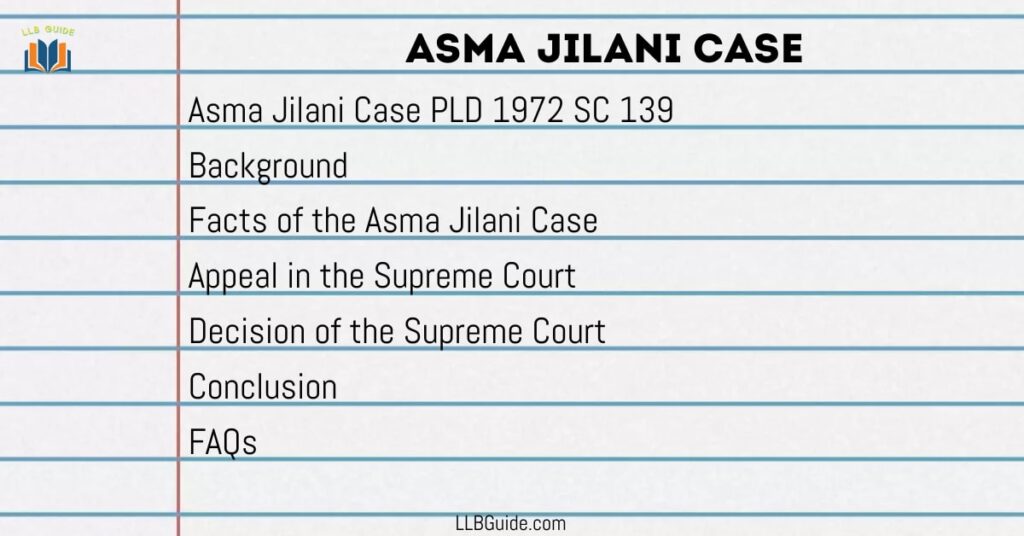Asma Jilani Vs. The Government of the Punjab case is a unique and important case in the Constitutional history of Pakistan. In the Asma Jilani case, the Supreme Court of Pakistan declared the first two Martial laws, by General Muhammad Ayub Khan on the 7th of October 1958 and General Yahya Khan on 21 March 1969, illegal.

Table of Contents
Asma Jilani Case Notes
The leading case Asma Jillani Case PLD 1972 SC 139 has been briefly and simply explained below.
Background
On 21 March 1969, General Yahya Khan imposed Martial law in the country became the Chief Martial Law Administrator, and abrogated the 1962 Constitution of Pakistan. He also dissolved the National Assemblies and Provincial Assemblies, and he preserved the Courts and existing laws but issued an order known as the “Removal of Doubts Order 1969”.
In this order, the Chief Martial Law Administrator General Yahya Khan imposed a bar on the jurisdiction of Courts and said that the Courts cannot issue a writ or pass an order that may be against the order or action of the Army Chief or any person under his authority.
Facts of the Asma Jilani Case
In the Asma Jillani Case, there were filed two writ petitions in the High Courts against the detentions by General Yahya Khan under Martial Law regulations number 78 of 1971.
- The first writ petition was filed by Mrs. Asma Jilani in the Punjab High Court, for the release of her father Malik Ghulam Jilani Advocate.
- The second writ petition was filed by Mrs Zareena Gohar in the Sindh High Court, for the release of her husband Altaf Gohar.
Both the writ petitions were dismissed by the respective High Courts on the ground that they did not have jurisdiction to allow these writ petitions following the Removal of Doubts Order 1969.
Appeal in the Supreme Court
Mrs Asma Jilani appealed the order of the Punjab High Court in the Supreme Court of Pakistan. This appeal was heard by 5 members bench including Chief Justice Mehmood ur Rasheed, Justice Waheed Ud Din Ahmad, Justice Muhammad Yaqoob Ali, Justice Salahuddin Ahmad, and Justice Sajjad Ahmad.
The prime question of the Asma Jilani case before the Supreme Court was whether the Courts have jurisdiction to pass an order on these writ petitions or not, whether the ‘Removal of Doubts Order 1969’ is a valid order or not, and whether the bar imposed on the jurisdiction of Courts in the ‘Removal of Doubts Order 1969’ is valid or not.
The second question was whether the judgment given in the Dosso Case was correct or not because the Federal Government was relying on the judgment of the Dosso Case.
In the Dosso case, Chief Justice Munir validated the Martial law imposed by General Muhammad Ayub Khan, based on Kelsen’s theory.
Decision of the Supreme Court
In Asma Jilani Case, the Supreme Court of Pakistan held that:
- The judgment of the Dosso case given based on Kelsen’s theory was invalid and incorrect because Kelsen’s theory was not universally accepted, we had Objective Resolution, and we had our own Constitution (Constitution of 1956).
- The Martial law imposed by General Yahya Khan was illegal.
- So, all the orders and regulations passed in this Martial law were also illegal.
- The detention of Mr. Malik Ghulam Jilani Advocate and Mr. Altaf Gohar under Martial Law Regulation number 78 of 1971 was also declared illegal and the Court issued the orders for their release.
- It was also held that the bar on the jurisdiction of Courts can not be imposed.
- The Supreme Court of Pakistan also directed the President of Pakistan Mr Zulfiqar Ali Bhutto to constitute a constitution for the Country and restore democracy.
Conclusion
In the Asma Jilani Case, the Supreme Court of Pakistan courageously declared illegal, the first and the second Martial laws imposed by General Muhammad Ayub Khan and General Yahya Khan respectively. The Supreme Court also gave direction to the President to make a new constitution for the country.
FAQs
What is Martial Law Regulation 78?
Martial law regulation 78 means the Martial Law authorities may detain a person for any length of time without giving him any reasons.
What is Article 190 of the Constitution of Pakistan?
Article 190 says that all executive and judicial authorities throughout Pakistan shall act in aid of the Supreme Court.
Who can remove the Chief Justice of Pakistan?
The President of Pakistan.
What is Article 191 of the Constitution of Pakistan?
Article 191 empowers the Supreme Court and High Court to make rules regulating its practice and procedure.

